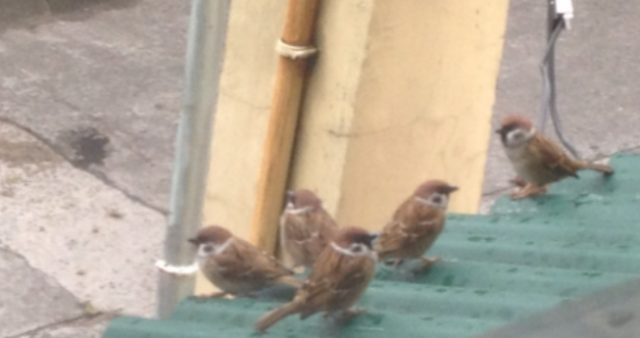
MANILA – Two weeks from now our mother, Lourdes “Lulu” Molina, will have been dead five years.
I say “dead” but I refuse to say she is “gone”. Every single day, after all, special “friends” she had nurtured in her twilight years still visit in her stead. And what a ruckus they make.
Birds she loved to feed regularly and predictably drop by, chirping incessantly from early- till mid-morning when, I suppose, they have to go someplace else. They return right after lunch to swoop down on the leftovers of the three dogs that Mommy loved with a passion and whom she taught to be “generous” to their feathered friends. She often told the dogs that she deliberately calculated their lunch to have some leftovers for sharing with the birds.
Mom heavily scolded the half-breed Corgi when the cunning canine grabbed a maya just as it was pecking at the rice in the dogs’ lunch bowl. The bird had no chance, and died even though the dog – then just two years old – let go of it on the garage floor right after Mommy gave it a smack on the back of the head.
“Now, look what you’ve done! You’re not supposed to kill any birds, remember!” Mommy shouted at the dog, speaking in Filipino with a smattering of some Spanish words led by, you guessed it, “Puñeta!”
This happened one more time in Mommy’s lifetime, and yet again a third time when she was no longer around. But in time the dog eventually understood: We – humans and canines alike – are but among God’s many creatures and must share the planet and its bounty with all.
So, yes, the birds still do swoop down on the dogs’ lunch bowls as soon as they sense the canines have finished their meal, and the dogs calmly watch them from a few feet away, their eyes occasionally winking, I swear, at their little brown visitors.
Early mornings, when there’s no lunch bowl yet to raid, the winged visitors are already dropping in, chirping noisily from all possible corners of the house where they could be heard. Just outside our bedroom windows, they chirp until we awake – or are woken. Many perch on the iron grills of what used to be Mommy’s bedroom window, diving down from the trellis thick with bougainvillea. More are outside the second floor window of my late brother’s room; dozens fly in and out of the sun-drenched spot where we usually take our breakfast. Finally, they converge and chat away at the foot of the wooden stairs leading to the second floor from the garage – where Mommy and her only sister, Milagros, liked to sit for their daily prayers, misalettes, novena sheets and rosaries in hand.

It’s the birds who remind me most of my mother, five years since her death, because, having come across a Mothers’ Day article I once wrote in TODAY, the defunct great daily published by the Locsins, I realized that the “9 things I learned” from Mom is an evolving list. Of course, they included timeless lessons: always be kind to people, even strangers, in contrast to the usual “don’t talk to strangers” warning of parents; never waste things – recycle and reuse; never waste time; put things in their proper places; avoid borrowing stuff unless for truly necessary or life-saving purposes; never fear to share, because God always finds a way to give you what you need.
And yet now, long after writing that article, and having enjoyed the company of Mom’s brown winged friends the past five years since her death, I realize that if I were to rank the lessons from that evolving list to which I must have mentally added dozens more, the most important lesson would be – and this I believe every mother should impart to a child – the universe is for all, and one must always happily share it with all creation.
I know Mommy got that lesson first from her own mother, who died at a young age of 37, as bombs fell on Manila during the liberation from Japanese rule. Yet I’m sure she distilled that lesson even more in her heart in the years she and her siblings lived as total orphans, from the end-stage of World War II, to the difficult years of rebuilding. She never tired of talking about the doctor from Aviles, who, finding her and her injured sister (she had borne her, piggyback, across the pontoon bridge from Paco, to San Miguel district near Malacañang), treated her sister for two months till the deep crater in one thigh, from a shrapnel, had healed.

She never tired of talking about the family of the nationalist icon Don Claro M. Recto, who became benefactors of the Cinco orphans. She, having been given a scholarship at a steno-typing class, later worked at the Recto law firm.
Mommy loved deeply and loyally the daughter of our long-time landlord in San Juan city (then Rizal), Dra. Mila Fernandez, because this doctora was like a living saint to San Juan’s poorest of the poor. Doctora Mila nurtured generations of San Juan’s most underprivileged, entering through alleyways and hovels to minister to countless of them – many plagued by tuberculosis or parasitic worms.
Mommy always strove to emulate the best traits of the people she idolized, like her mother and the doctora. She befriended market vendors, giving them old newspapers and recycled brown bags and plastic bags for their goods. In turn, they always took care of her whenever her epileptic attacks happened while she was out in the market.
Mommy never tired of counselling us to be wary of evil men, but nonetheless preached love for strangers as well. When I had just started working, a man in his thirties, obviously one who had taken leave of his senses, grabbed my hand as I stepped off a bus at the street corner. He turned out to have been a homeless neighborhood character, whom my mother had adopted, giving him coffee and bread regularly. He had recognized me and thus offered to take my bags and walk me home to my mother.
Mommy personified the generosity and faith in the biblical story of the widow’s mite. Once, I called her from the first newspaper office I worked in, just to pour out my heart because I was assigned to cover the story of a teenager from Bicol who had been sideswiped by a train, and was to undergo surgery for a head injury at a government hospital in Manila. I choked as I told her how hard it was to interview the teen’s mother, an illiterate old woman who obviously was at her wits’ end, and was incoherent. I said I had volunteered to buy the medicines and get the blood for the surgery, but my cash was not enough. Mommy simply, quickly, made a decision: she told me to get all the funds she had kept for a bank account I was opening for her, and give the money to the boy’s family. It was just a few hundreds, but it was all she had, and she insisted I take it to the poor woman.
Mommy took care of nine children of her own, and a tenth – the daughter of her only sister, who was widowed just months after her wedding. Yet with 10 children in her care, Mommy enjoyed hosting our friends who came by and stayed for hours or for sleepovers, whether we were doing school projects or just bonding on summer vacations. As she did with all her pre-war and war-time friends, she diligently noted down the important dates in the lives of her children’s friends: reminding us to call them on their birthdays, feast days and later, even wedding anniversaries.
Since her death, the friends I remember to greet on their birthdays always chide me with, “Oh, your mom reminded you, huh?”









